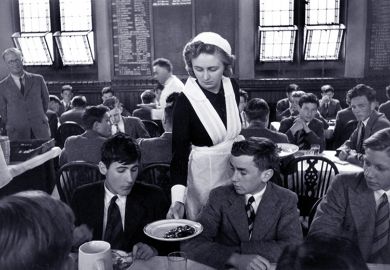Why go to university? When asked, today’s students are openly careerist and materialist. In a 2012 survey by the Higher Education Research Institute in Los Angeles, almost 90 per cent held that “being able to get a better job” was a “very important” or “essential” reason to go to college. The rationales of being “very well-off financially” and “making more money” were almost as popular.
When economists measure education’s financial rewards, we’re often accused of being blind to loftier motivations. But maybe there’s not much to see. Indeed, since human beings reliably sugar-coat their intentions, students are probably even more careerist and materialist than they admit.
True, the fact that students come to campus in search of jobs and money does not show that they actually find them. Education and earnings are statistically linked in every known country – and the pattern is especially pronounced in the US and UK. But education’s true rewards are almost surely smaller than they naively appear.
How so? Most obviously, many educational investments end in failure. Only about 40 per cent of full-time US college students finish on time; many never finish. A prudent student therefore won’t take academic success for granted; he’ll assess his personal dropout risk and factor it into his calculations. An immodest assessment poses a grave financial danger because most of education’s financial rewards come from graduation. If you drop out of high school or college after three and a half years, the pay-off is mediocre at best.
More subtly, we tend to overestimate schooling’s true rewards because educational success is usually packaged with other valuable traits. Key fact: the well educated usually start school with a long list of pre-existing advantages, including intelligence, discipline and connections. When they graduate, it’s tempting to give their degree full credit for their financial success. The right question to ask, though, is: “How much extra success would a degree yield if it weren’t combined with unusual intelligence, discipline, connections and so on?” A reasonable answer is that just over half the extra income the average graduate earns is genuinely caused by their education.
Still, it’s tempting to conclude that subsidising strong students remains a good use of tax dollars. But, as I argue in my new book, The Case Against Education, this inference is premature because there are two separate ways for education to raise income. Education can raise graduates’ income by teaching useful job skills, transforming unproductive youths into productive adults. But education can also raise graduates’ income by certifying (or “signalling”) their employability. Academic success – even in a field such as poetry, history or Latin – helps convince employers of your braininess, work ethic, conformity and other desired traits. No wonder students hunt for teachers who award high grades for token effort; it’s the easiest way to impress prospective employers.
Selfishly speaking, to be clear, it doesn’t much matter why education pays. Excel in school and the labour market (usually) rewards you; what more do you need to know? For taxpayers, however, the why is all-important. Teaching useful skills enriches the student by enriching society. Merely minting extra credentials, in contrast, enriches the student at the expense of others. After all, if your degree increases your pay but not your productivity, your gain must be society’s loss.
Picture a world where everyone spent four more years at college, showing off for employers without learning any practical skills. Personally, you probably wouldn’t want to drop out because you’d look bad by comparison. But, socially, what would be the point of making everyone jump through yet another series of hoops?
This may seem like a fanciful example, but it’s not. As education levels have increased, employers have indeed ratcheted up their educational expectations. Researchers call this process “credential inflation”. Nowadays, if you want to work, you typically need three more years of education than your grandparents would have needed for one and the same job. Sure, intellectually demanding industries such as IT have grown. But the main effect of the vast expansion of education is that legions of waiters, bartenders, security guards and secretaries now need college degrees. They don’t need these degrees to actually do their jobs, of course; they just need them to outshine the competition. And while students’ motives are clear – they’re running lest they fall behind – fuelling credential inflation is a truly futile use of taxpayers’ money.

Given students’ avowedly mercenary educational motives, you might think that friends of the educational status quo would staunchly defend its economic benefits. Some do, of course – insisting that even seemingly useless classes such as Latin subtly yet dramatically enhance job performance. Yet most defenders of education have a rather different reaction: “It isn’t supposed to be job training.” Education’s real purpose, instead, is to save our souls – to turn ignorant youths into enlightened citizens. Economic benefits, if any transpire, are merely a welcome bonus. Education is great because it makes our lives worth living – and our society worth living in.
In all candour, these high-minded slogans resonate with me. Ideas and culture are my life. In my classes, I always teach “economics for the citizen”, striving to show students the connections between classroom material and wise public policy. Stereotypical economists may not care about loftier goals, but we all should. Nevertheless, there is a world of difference between saying “Education should turn ignorant youths into enlightened citizens” and showing that existing education actually has these effects. If you want to praise education as we know it, you need to show that it genuinely delivers on these transformative promises. Does it?
For the most part, no. Even when schools have the means, motive and opportunity to transform their students, their concrete accomplishments are minimal. Let’s start with the education system’s most ubiquitous and least controversial mandate: instilling appreciation of high culture, especially literature and poetry. If schools fulfilled their mission, adult consumption of high culture would be widespread. It’s not. Americans spend just 0.2 per cent of their income on reading materials of all kinds – and literature and poetry are only a tiny slice of this tiny sum. Spending was higher before the internet, but simple Google searches prove that high culture is a rounding error in a sea of pop culture: there are more hits for “Kardashian” than “Shakespeare”. The point is not that only high culture is worthy of attention. The point is that there is negligible voluntary consumption of the culture that schools enthusiastically promote from kindergarten onwards.
American schools also require years of study of civics and history. The hope, naturally, is that students will retain and use their knowledge for a lifetime. Without a thorough understanding of how government works and what happened in the past, how can citizens judge their leaders’ performance or wisely cast their votes? When scholars actually measure adults’ knowledge of these subjects, however, the results are dismal. Think of the bare basics of civics and history: questions such as “What are the three branches of government?” and “In what century did the American Revolution begin?” The average adult American knows roughly half these elementary facts. Is that really so bad? Well, if someone knows half the letters in the alphabet, he isn’t “half-literate”; he’s illiterate. The same goes for people who know only half the basics of civics and history; as a practical matter, they simply can’t comprehend what their government is doing.
Critics of the education system often paint classrooms as centres of left-wing indoctrination. But while it’s true that teachers and, especially, university professors lean left, these fears are greatly overblown. Sure, there are plenty of lectures tainted by political bias – conscious and unconscious, blatant and subtle. But the measured effect of students’ time in school on their ideology is minuscule. Suppose you measure liberalism versus conservatism on a seven-step scale, ranging from “extremely liberal” to “extremely conservative”. A high estimate is that a year of education causes students to become a mere 0.028 steps more liberal. Sometimes even political scientists need microscopes.
Education’s effect on views regarding specific issues is larger. Correcting for many other factors, education noticeably raises support for civil liberties and tolerance, and cuts racism and sexism. Why, then, does education fail to increase overall liberalism? Because educated people tend to combine their social liberalism with economic conservatism. Again, adjusting for numerous confounding factors, education elevates support for free markets, capitalism and globalisation. It is this eclectic mix of issue positions that makes education’s overall ideological effect so muted.
But why on earth would education have this mixed political effect? Given educators’ leftist leanings, it is hard to believe that they are trying to instil economic conservatism in their pupils. What then explains the well educated’s ideological evolution? Well, if students aren’t conforming to the views of their teachers, the simplest alternative explanation is that they are conforming to the views of their fellow students. Social scientists call these “peer effects”. If you give a religious kid secular peers, he’ll probably become more secular; if you give a secular kid religious peers, he’ll probably become more religious.
If your goal is simply to transform one individual, reshaping their peer group is a fine way to do it. But peer effects are a highly ineffective way to transform society, for either good or ill. Suppose, for example, you want to spread your religion. If you prevent your children from socialising with unbelievers, you’ll probably keep more of them in the faith. But you simultaneously cut the odds of converting outsiders, because your kids are no longer around to influence them. Similarly, if you want to push politics in a socially liberal, economically conservative direction, using college to cluster young people who share these inclinations is largely futile. Yes, peer effects will push college students in the desired direction. But young people who don’t go to college, deprived of their college-going peers, almost automatically move in the opposite direction. Net long-run political effect of education? Unclear – as the massive educational split in the 2016 US election illustrates.
This insight generalises broadly. Even when education clearly shifts students’ outlook and lifestyle, peers are normally the driving force. As a result, although education can reshape the souls of individual students, it has little effect on the soul of our society. Spending more years in school makes you more likely to vote – but has little effect on overall voter turnout. Spending more years in school makes you more likely to marry and less likely to divorce – but has little effect on overall marriage or divorce rates. The most noteworthy exception is that, at least in the US, education seems to depress fertility for society as well as individuals. Since birth rates are already quite low, this is probably nothing to celebrate. But the effect does seem genuine.

Since I’m an economist, critics often fault me for questioning education’s economic benefits. The easy reply for me is: “It’s hardly economists alone who care about education’s economic rewards. So does almost everyone.” If most people conceded that education provided little economic benefit for the country, substantial cuts in government funding would not be far behind. But this reply is too hasty. While most people care about the economy, they also care about a host of intangibles. If education noticeably enriched our very humanity, it would be a strong argument in its favour.
Unfortunately, the spiritual benefits of education are as overrated as its material benefits. High aspirations are woven into the fabric of our education system. But no system can be properly praised for mere aspirations. If you defend education for promoting culture or sustaining democratic values, you should at least try to measure these effects in the real world.
When we actually measure, we learn two things. First, some of education’s most heralded achievements are tiny at best. Since consumption of high culture is barely visible, education can’t possibly deserve much credit for elevating our tastes. Second, when education does mould students, it usually does so through peer effects. As a result, even big effects on individual students don’t add up to a big effect on society. We’d all like the education system to enrich our society and our souls. In practice, it’s bad at both.
Bryan Caplan is professor of economics at George Mason University, in Virginia in the US, and author of The Case Against Education: Why the Education System Is a Waste of Time and Money (Princeton University Press).

Diminishing returns: degrees as ‘positional goods’ and a cache of graduate clerks
Grade and credential inflation is a universal human tendency. There are badges of esteem, which relate in complex ways to feelings of self-esteem, and the desire to acquire these is always present, as is the pressure to make them available.
For example, in societies in which there is a defined aristocracy, the proportion of the population who are aristocrats tends to rise. It was about 15 per cent in both France and Russia before their respective revolutions. In England, it has never risen above a fraction of 1 per cent and I have always believed that small proportion was the key to the aristocracy’s survival (the crucial trick was the invention of other honours, such as knighthoods and life peerages, to reward the ambitious and the worthy).
My late colleague, Fred Hirsch, in Social Limits to Growth offered a penetrative theoretical insight into grade and credential inflation because most of the inflated items are close to his model of “positional goods”. These are valued because of the way they place you in society; thus their supply cannot be increased without reducing their unit value. Some of them, such as prestigious addresses, have a natural limit on supply, but others, including university degrees, do not. So, given the endemic pressure to increase supply we should not be surprised to see the proportion of graduates grow. Fred was certainly familiar with that process in his native US and may well have known the comment that Arthur Miller puts into the mouth of his factory owner, Joe Keller, in 1947’s All My Sons: “It’s getting so the only dumb ones left are the bosses...you stand on the street today and spit, you hit a college man.” And nobody is now instructing their children, as my late mother instructed me, to add “Esquire” to the envelopes of their “thank you” letters if the recipient is a university graduate.
But even if degrees are almost entirely positional goods, that is not necessarily to say the same of university education. That, surely, might be expanded indefinitely without diminishing its value. The question therefore must be whether university is enjoyable for the 45 per cent of the age cohort who would not have traditionally attended. And how much do they gain from it, in terms of skills and earning potential – not compared with those left out of the process but compared with similar people in previous generations.
Of course, I can’t give a definitive answer, but my experience suggests some pretty pessimistic hypotheses. I’ve always been aware that most people don’t like serious intellectual effort. Of the dozen undergraduates doing politics, philosophy and economics in my college in my year, I think that only two of us really enjoyed the work. In more recent years, I have been made aware of academic situations in which there was barely a remaining pretence of serious intellectual interest: organised student complaints because a 25-page reading was considered too long and 30 per cent attendance rates at compulsory seminars deemed a good result.
So, the nightmare scenario: you are at “uni” because you fear that you will never get a decent job unless you do go and because you don’t want to feel inferior for the rest of your life. You don’t much enjoy academic work and your debts are increasing. But you are gradually becoming aware that your degree, although likely to be “good” (grade inflation), is unlikely to get you the kind of job that you aspire to. You are also becoming aware that there is a positional good that they haven’t shared out and that is the names of the “top” universities. I have taught people who have come to these realisations while having to hold down two jobs and having family responsibilities as well; I was not critical when they fell fast asleep in my lectures.
Political debate often assumes unquestioningly that expanded higher education and prosperity are causally connected. Of course, Sweden is much richer than Burundi and has many more people in higher education, but the causal process is largely the other way round. If you look at the comparisons between “developed” countries, there are two significant observations that undermine any idea that higher education per se is good for economies. The first is that the definitions of “higher education” and “university” are not just very varied but politically driven and changeable by decree. The second is that, among “developed” countries, some of the more economically threatened are at the top of the list for university participation (such as Russia on 54 per cent), while the prosperous are sometimes near the bottom (such as Switzerland on 40 per cent). This suggests that lack of alternatives and, perhaps, the desire to exit the nation may be important in the pattern of motivation.
The ultimate indictment of expansion may be its role in the restriction of social mobility. Forms of hierarchical class structure are universal, but levels of social mobility vary enormously. Historically, the church and the navy were very important conduits of British social mobility, but their influence peaked in the Victorian age. In the 20th century, universities were extremely important: to take a personal example, they were the primary means whereby my wife and four of her brothers achieved highly paid jobs in spite of a very poor (albeit highly respectable) background.
But when the proportion of graduates goes up from 5 per cent to 50 per cent, the possibility of such elevation diminishes dramatically. John Major will surely be the last non-graduate British prime minister and many of his contemporaries will be the last non-graduates in their senior roles, too. Meanwhile, the world fills with graduate clerks, and one fears for the ultimate social and political consequences.
Lincoln Allison is emeritus reader in politics at the University of Warwick and the author of books on subjects including sport, political philosophy and travel.
POSTSCRIPT:
Print headline: My learned friends
Register to continue
Why register?
- Registration is free and only takes a moment
- Once registered, you can read 3 articles a month
- Sign up for our newsletter
Subscribe
Or subscribe for unlimited access to:
- Unlimited access to news, views, insights & reviews
- Digital editions
- Digital access to THE’s university and college rankings analysis
Already registered or a current subscriber?


